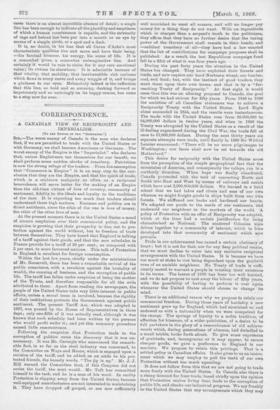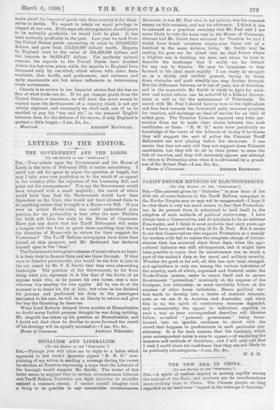CORRESPONDENCE.
A CANADIAN. VIEW OF RECIPROCITY AND IMPERIALISM.
[TO 155 EDITOA OF 11113 " SPEOTATOR."]
SIR,—The worst enemy of Canada is the man who declares that, if we are permitted to trade with the United States or with Germany, we shall become Americans or Germans. The worst enemy of the Empire is the "Imperialist" who declares that, unless Englishmen tax themselves for our benefit, we Abell perform some sudden stroke of treachery. Patriotism is now the strong refuge of the traders. From the assumption that "Commerce is Empire" it is an easy step to the con- clusion that they are the Empire, and that the spirit of trade, which is ,a stubborn malignity as often as a reciprocal benevolence, will serve better for the making of an Empire than the old-time virtues of love of country, community of sentiment, fidelity to the ideals and loyalty to the traditions of the race. It is expectiug too much that traders should understand these high matters, Business and politics are in direct antithesis, since the ethic of the one is love of money, the ethic of the other love of men.
At the present moment there is in the United States a mood of sincere scepticism over their commercial policy, and the suspicion is growing that their prosperity is 'due, not to pro- tection against the world without, but to freedom of trade between themselves. They have heard that England is talking of a tariff against their goods, and that the new schedules in France provide for a tariff of 20 per cent., as compared with 5 per cent. to more favoured nations. This talk of Protection in England is excellent for foreign consumption.
"Within the last few years, chiefly under the ministrations of Mr. Roosevelt, there has been a remarkable revival of the public conscience, with a revulsion against the brutality of wealth, the cunning of business, and the corruption of public life. The tariff has fallen under suspicion of being the mother of the Trusts, and therefore responsible for all the evils attributed to them, Apart from reading the newspapers, the people of the United States take very little interest in public affairs, unless a moral issue is involved, because the rigidity of their institutions protects the Government against public sentiment. The present Tariff Act, which was adopted in 1897, was passed by the House of Representatives in three days ; only one-fifth of it was actually read, although it was known that each schedule bad been written by the persons who would profit under it; and yet this summary procedure caused little remonstrance.
Following the suspicion that Protection leads to the corruption of politics came the discovery that it was un- necessary. It was Mr. Carnegie who announced the remark- able fact, in so far as the steel industry was concerned, to the Committee on Ways and Means, which is engaged upon a revision of the tariff, and he added, as an aside to his pro- tected friends, the homely words, "The jig is up." Mr. J. J.
Hill warned the Committee that, if this Congress did not revise the tariff, the next would. Mr. Taft has committed himself to the task, and he is a man of his word. In reality Protection is slipping away from the United States, because well-equipped manufacturers are not interested in maintaining it. They have dropped off gorged, or are now sufficiently well nourished to meet all comers, and will no longer pay money for a thing they do not want. With an ingratitude which is sharper than a serpent's tooth to the politicians, they affirm that they have no further desire that the taxing power of the Government shall remain in their hands, and —subtlest treachery of all—they have had a law enacted that the list of contributions for campaign purposes shall he published. As a result, the last Republican campaign fund fell to a fifth of what it was four years ago.
During the past forty years the situation in the United States has changed. They have exploited their forests and lands, and now require our hard Northern wheat, our lumber, coal, and food; but, with the instinct of good 'traders, they want them upon their own terms, and that is by a "far- reaching Treaty of Reciprocity." At first sight it would seem that this was an alluring proposal to Canada, the goal for which we had striven for fifty years. • From 1846 to 1896 the ambition of all Canadian statesmen was to achieve a Reciprocity Treaty with the United States. Lord Elgin alone succeeded in 1854, and the results were instantaneous. The trade with the United States rose from 20,000,000 to 84,000,000 dollars in twelve years, a'nd when in 1866 the Treaty was abrogated by the United States as a result'of the ill-feeling engendered during the Civil War, the trade fell at once to 57,000,000 dollars. During the next thirty years six separate attempts were made, until finally in 1896 Sir Wilfrid Laurier announced : "There will be no more pilgrimages to Washington ; our faces shall now be set towards the old Motherland."
This desire for reciprocity with the United States arose from the perception of the simple geographical fact that the mountains of America, and consequently the valleys, run in a northerly direction. When hope was finally abandoned, Canada proceeded with the task of converting North and South into East and West by means of railWays and canals which have cost 2,000,000,000 dollars. We learned in a bard school that we bad lakes and rivers and seas of our own whereon we might freight goods in ships built from our own forests. We stiffened our backs and hardened our hearts. We adapted our goods to the needs of our customers, and undersold our neighbour in the markets of the world. A policy of Protection with an offer of Reciprocity was adopted, which at the time had a certain justification for being characterised as National. The scattered Colonies were driven together by a community of interest, which in tinie developed into that community of sentiment which now prevails.
Pride in our achievement has caused a certain obstinacy of heart; but it is not for that, nor for any deep political reason, that we must decline to enter into any exclusive reciprocal arrangements with the United States. It is because we have too much at stake to risk being dependent upon the goodwill even of an amiable neighbour. No Treaty of trade is suffi- ciently sacred to warrant a people in trusting their existence to its terms. The lesson of 1806 has been too well learned, and we do not propose to cast away the labour of fifty years, with the possibility of having to perform it over again whenever the United States should choose to change its mind.
There is an additional reason why we propose to retain our commercial freedom. During those years of hardship a new
sentiment grew up for England, which had nourished us, and
endowed us with a nationality when we were competent for the charge. The springs of loyalty to a noble tradition, of affection for kinsmen, of a wider patriotism, of a desire to be full partakers in the glory of a remembrance of old achieve- ments which, during generations of absence, had dwindled to a small trickle, brOke forth afresh. To give some expression of gratitude, and, incongruous as it may appear, to secure cheaper goods, we give a preference to England in our markets. We propose to retain this privilege. That is a settled policy in Canadian affairs. It also gives to us an instru- ment which we may employ to pull the teeth of our own Protection without too much squealing.
It does not follow from this that we are not going to trade more freely with the United States. In Canada also there is a rising demand for freer trade, based chiefly upon the opinion that Protection makes living dear; leads to the corruption of public life, and checks our industrial progress. We say frankly to the United States that any arrangements which they may make about the import of goods into their country is for them- selves to decide. We expect to retain an equal privilege in respect of our own. .If the separate arrangements should prove to be mutually profitable, we would both be glad. It has been mutually profitable in the past. Last year we took from the United States goods amounting in value to 210,652,825 dollars, and gave back 113,516,600 dollars' worth. Exports to England were to the value of 134,488,056 dollars, and the imports to 94,959,471 dollars. For perfectly natural reasons, the exports to the United States have doubled within the last nine years, while the exports to England have increased only by one-third, which shows, with other facts available, that tariffs, and preferences, and surtaxes, and spite enactments are but minor influences in determining .trade movements.
Canada is so secure in her Imperial status that she has no _fear of what trade can do. If we get cheaper goods from the United States or elsewhere, we will have the more money to expend upon the development of a country which is not yet. wholly explored, and eventually we shall each one of us be enabled to pay his " ten and six," as the meanest English labourer does, for the defence of his shores, if only England is
• patient a little longer.—I am, Sir, &c.,















































 Previous page
Previous page